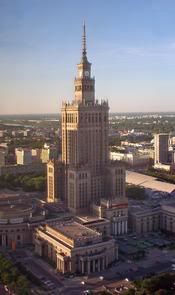Walesa: I See No Place for Me in Poland
APGDANSK, Poland (AP) - Solidarity founder Lech Walesa said Tuesday he sees no place for himself in Poland's public life - despite his achievement in founding the movement 25 years ago that helped topple communism throughout Eastern Europe.
Speaking a day before the anniversary of Solidarity's birth, the former shipyard electrician - also Poland's first democratically elected president - said he had considered running again in October elections this year but gave up when he realized he could only count on support from several thousand people.
``I used to lead 10 million people, so what use to me is just 1,000?'' Walesa, 61, said in an interview with The Associated Press in his office in Gdansk. ``From a logical point of view, there is no room for me here.''
Solidarity attracted an estimated 10 million in Poland - about a third of all adults - during its heyday in 1980 and 1981 before communist leader Gen. Wojciech Jaruzelski cracked down by imposing martial law. Jaruzelski intended to crush Solidarity with his Dec. 13, 1981, decree, but the movement eventually prevailed, leading to negotiations in 1989 with the ruling communists who gradually ceded their power without a fight.
``I made the right decisions, I set everything on the right course, the reforms are going in the right direction,'' Walesa said.
``At that time, I tried to control enthusiasm and streamline it in the right direction,'' Walesa said. ``Today I only try to share my experience, pass it on and do something good for the world.''
But he conceded: ``Naturally, I would prefer to be cheered than booed at the anniversary ceremonies.''
On Monday, a splinter group of other Solidarity activists, including Anna Walentynowicz - the shipyard worker whose dismissal sparked the strikes that led to Solidarity - held their own parallel event in protest.
They are critical of Walesa, saying he has betrayed Solidarity's ideals by compromising with communists in the past and today, and are galled he is taking part in events joined by former communists.
Walesa said he spends more than six months a year giving lectures on Solidarity abroad, where he is often seen as more of a hero than at home following what many people think was a less than successful presidency from 1990-95.
Walesa began his term of office as a national hero, but his popularity waned amid perceptions he was trying to run the country single-handedly. He alienated former advisers and failed to deliver on social welfare promises as many people lost their jobs amid the transition from communism to free markets.
Walesa, speaking in his spacious and airy office in Gdansk's old town, said his open attitude to other people made him shake hands with former foe, ex-communist Aleksander Kwasniewski, who defeated him in the presidential election of 1995.
Walesa and Kwasniewski shook hands for the first time in many years at the funeral in April for Polish-born Pope John Paul II in a gesture of reconciliation. ``I have always been and will be an enemy of communism, but I love all people,'' Walesa said.
He said the celebrations of Solidarity 25th anniversary that are drawing many foreign leaders to Poland evoke no emotions in him.
The anniversary celebrations culminate Wednesday with a Mass celebrated by Stanislaw Dziwisz, the newly installed archbishop of Krakow, who is Pope Benedict XVI's envoy. Dziwisz was the longtime aide of Polish-born John Paul, who is credited with inspiring Solidarity.














0 Comments:
Post a Comment
< Main